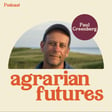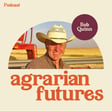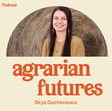
Losing 10,000 Farms a Year — And How to Reverse It with Brian Reisinger
Are fewer, bigger farms putting our entire food system at risk?
That’s the warning at the heart of Land Rich, Cash Poor, the latest book by Brian Reisinger. In it, he explores the forces—technological, political, and economic—that have hollowed out rural America and made it harder than ever to keep a family farm alive. Drawing from his own multigenerational farming roots in Wisconsin, Brian traces how policy choices and market consolidation have left farmers squeezed—sometimes literally sitting on millions of dollars of land they can’t afford to keep.
In this episode, we dive into:
- Why the U.S. has lost over 70% of its farms in the past century—and what that’s done to rural communities.
- The role of technology and policy in fueling unnecessary consolidation.
- How farm crises, past and present, continue to push out small and mid-sized producers.
- The rise of land as an investment asset—and what that means for food producers.
- The growing divide between those who own the land and those who work it.
- Why America’s tradition of small landowners is worth fighting for.
- What scale-neutral technology and smarter R&D could do to level the playing field.
- How we create real economic opportunity for a new generation of small farms.
More about Brian:
Brian Reisinger is an award-winning writer and rural policy expert who grew up on a family farm in Sauk County, Wisconsin. Reisinger worked with his father from the time he could walk, before entering the worlds of business journalism and public policy, then going on to work as a columnist and consultant. He lives to tell the hidden stories of rural America and has been published by USA Today, Newsweek, Yahoo News, the Milwaukee Journal Sentinel, PBS/Wisconsin Public Radio’s “Wisconsin Life,” The Daily Yonder, RealClearPolitics, The Hill, and elsewhere. He’s given a TEDx talk on risks to our food supply, and appeared on C-SPAN’s “Washington Journal,” CNN, public radio, farm radio, and other outlets across the political spectrum. Reisinger’s writing has won awards from the National Society of Newspaper Columnists, first place in the Seven Hills Literary Contest, a Solas Award, and more. He lives with his wife and daughter, and helps lead Midwestern-based Platform Communications, splitting time between northern California and the family farm in Wisconsin. Land Rich, Cash Poor is his first book.
Find him on X: @BrianJReisinger
Agrarian Futures is produced by Alexandre Miller, who also wrote our theme song. This episode was edited by Drew O’Doherty.



















